#netflix alexander the great
Explore tagged Tumblr posts
Note
Shows or movies based on historic figures and events are hard to pull off if the goals are to be both entertaining and somewhat true to history. If we accept that some inaccuracies can't be avoided in order to appeal to audiences what would you consider cornerstones and pillars about Alexander and his history that can't/shouldn't be touched in order to paint a somewhat realistic picture in media based on him and his life?
How to Make a Responsible Movie or Documentary about Alexander
I saved this to answer around the time of the Netflix release. For me, there are four crucial areas, so I’ll break it down that way. Also. I recognize that the LENGTH of a production has somewhat to do with what can be covered.
But, first of all…what story is one telling? The story arc determines where the focus lies. Even documentaries have a story. It’s what provides coherence. Is it a political tale? A military one? Or personal? Also, what interpretation to take, not only for Alexander but those around him. Alexander is hugely controversial. It’s impossible to make everyone happy. So don't try. Pick an audience; aim for that audience.
MILITARY:
Alexander had preternatural tactical skills. His strategy wasn’t as good, however, especially when younger. Tactics can be a genius gift (seeing patterns), but strategy requires experience and knowledge of the opposition. The further into his campaign, the more experience he gained, but the cultures became increasingly unfamiliar. He had ups and downs. He was able to get out of Baktria finally by marrying Roxana. That was strategy, not tactics. He beat Poros, then made a friend of him; that’s strategy. Yet he failed to understand the depth of the commitment to freedom among the autonomous tribes south along the Indus, which resulted in a bloody trek south. And his earlier decision to burn Persepolis meant he’d never fully reconcile the Persian elite.
So, it’s super important to emphasize his crazy-mad tactical gifts in all forms of combat, from pitched battles to skirmishes to sieges. Nobody in history ever equaled him except maybe Subatai, Genghis Khan’s leading general. In the end, I think that’s a lot of Alexander’s eternal fascination. He fought somewhere north of 250 battles, and lost none (where he was physically present).
But HOW to show that? What battles to put on screen? Oliver Stone combined three into one + Hydaspes because he had only 2-3.5 hours (depending on which cut you watch). The Netflix series is going to show all four of the major pitched battles…or at least all 3 for the 6-episode first part. They had circa 4.5 hours to play with, but they cut out other things, like Tyre.
Another issue, from the filming/storytelling point-of-view is how to distinguish Issos from Gaugamela for the casual viewer. They’re virtually identical in tactics (and players on the field). So it made a fair bit of sense to me for Stone to conflate them. In a documentary, it’s more important to separate them, largely to discuss the fall-out.
Some v. important clashes weren’t the Big Four. Among these, the sieges of Halikarnassos and Tyre are probably the most impressive. But the Aornos Rock in India was another amazing piece. I’d also include the bridging of the Indus River to illustrate the astonishing engineering employed. Again, if I had to pick between Halikarnassos and Tyre, I’d pick Tyre. I was a bit baffled by Netflix’s decision to show Halikarnassos instead, but I think it owed to an early error in the scripts, where they had Memnon die there. I corrected that, but they’d already mapped out the beats of the episodes, so they just kept Halikarnassos. That’s fine; it was a major operation, just not his most famous siege.
Last, I really wish somebody, someday, will do something with his Balkan campaigns. What he did in Thrace and Illyria, at just 21, showed his iron backbone and quick thinking. It’d make a great “and the military genius is born” set-up, drama wise. But you could use the Sogdian Rock to show the clever streak, at least (“Find men who can fly” … “I did; look up.” Ha) Plus it has the advantage of being where he (maybe) found Roxana.
Last, he fought extremely well--wasn't just good at tactics. Being a good general doesn’t necessarily mean one’s a good fighter. He was. Almost frighteningly brave, so show that too.
RELIGIOUS:
Ya gotta deal with the “Did he really think he was a god?” thing, and the whole trip to Siwah. I obviously don’t think he believed he was a god; it’s one of the things I disliked about the Netflix show’s approach, but they were dead-set on it. I DO think he came to believe he was somehow of divine descent, but of course, that’s not the same as most moderns understand it, as I’ve explained elsewhere. It made him a hero, not a god on a level with Zeus, and to ME, that’s an important distinction that Netflix (and to some degree Stone) rode roughshod over.
But I’d like to see more inclusion of sacrifice and/or omen-reading—religion in general. Cutting the Gordion Knot (omens!). His visit to Troy (Netflix tackled that one). A really cool thing would be to make more of the lunar eclipse before Gaugamela. Again, Netflix touched on that, but it’s one of those chance events that might actually have affected a battle’s outcome, given how seriously the ancient near east took sky omens. (A solar eclipse once halted a battle.) The Persians were freaked out. Even his massacre of the Branchidai in Sogdiana was driven by religion, not military goals. Pick a couple and underscore them.
I give Stone big props for the sacrifice before the Granikos/Issos/Gaugamela battle. It was so well-done, I’ve actually shown it in my classes to demonstrate what a battlefield sphagia sacrifice would look like.
Alexander was deeply religious. Show it.
POLITICAL:
Ah, for ME the most interesting stuff surrounding Alexander occurs at the political level. Here’s where the triumph story of his military victories all went south. He knew how to win battles. He was less good at managing what he’d conquered.
In terms of a story arc, the whole period up to Gaugamela is really the “rise” of the story. Post-Gaugamela, things began to collapse. And I would pin the turn on PERSEPOLIS. Yes, burning it sent home a message of “Mission accomplished.” But he was selective about it. Areas built by Darius I were spared, Xerxes’ were destroyed: a damnio memoriae.
Problem: Persepolis embodied Persia, and ATG essentially shat on it. Not a good look for the man who wanted to replace Darius III. That he also failed to capture and/or kill Darius created an additional problem for him. Finally, his lack of understanding of how politics worked in Baktria-Sogdiana resulted in an insurgency. Bessos was going to rebel, regardless. But Spitamanes might not have. Alexander created his own mess up there.
Another matter to look at is why he created a new title—King of Asia—instead of adopting the Persian title (King-of-Kings). I don’t think that was a “mistake.” He knew perfectly well the proper Persian title (Kshāyathiya)…and rejected it. He adopted some Persian protocol, but not all of it. After the summer of 330, he was essentially running two parallel courts, which seemed to satisfy neither the Persians nor his own men. (Kinda like docudramas are a hybrid that seems to annoy perhaps more than satisfy.)
So I’d like to see this handled with some nuance, but it’s intrinsically difficult to do—even while, if done well, it would be the most interesting part of an Alexander story, imo.
So, what events, what events…3-4 leap out after Alexander’s adoption of some Persian dress. The Philotas Affair, the Pages Conspiracy, the Death of Kleitos, the marriage to Roxana. I’d show it all, although I could also understand reducing the two conspiracies to one, for time, in which case, the Philotas Affair because it resulted in the fall of Parmenion. But the fact there were two, not just one, tells a story itself.
What about the proskynesis thing with Kallisthenes? I’ve come to disbelieve it ever happened, even though it’s symbolic of the whole problem. So, weirdly, I’m of two minds about showing it. OTOH, it won’t be in my own novels. But OTOH, I could easily see why a showrunner or director might want to include it. And it certainly appears in several of the histories, including Arrian.
Then we have the two indisciplines (mutinies)…one in India that made ATG turn around, and another at Opis. They’re really two different things as one was an officer’s rebellion, the other the soldiers themselves. But will viewers be able to distinguish between them? It’s like the Issos/Gaugamela problem, or for that matter, the two conspiracies. They’re similar enough to confuse the casual viewer. “Didn’t we already see that?”
But if they were narrowed to one, how to choose? The mutiny on the Hyphasis provides an explanation for why he turned back. But the Opis event was more dramatic. The man jumped down into the middle of a rioting crowd and started (essentially) knocking heads together! So if I had to pick…Opis. The other might could be mentioned in retrospect.
PERSONAL:
Here are five things I think really OUGHT to be shown, or that I have yet to be pleased by.
1) Philip isn’t an idiot and should get more than 10 minutes of screentime. Oh, and show Alexander did learn things from him. Stone had to make his movie a Daddy-Issues flick, and the Netflix thing did very little with Philip as they wanted to get to the Alexander-Darius face off (which was the meat of their story). But there’s a very interesting love/competition story there.
2) Olympias is not a bitch and was not involved in Phil’s murder, although I can see why that is catnip to most writers. She did kill Eurydike’s baby and (by extension) Eurydike. One of the historians in the Netflix story (Carolyn, unless I misremember) talked about the rivalry between the two wives, at least. But I think ATG planned to marry the widow and Olympias got rid of her to prevent it. Now THAT’S a story, no? But they were in too much of a hurry to get to Persia.
3) Alexander was not an only child! He had sisters (and a brother) with whom he was apparently close…and a cousin who was his real rival. To me, missing that cousin rivalry overlooks a juicy personal/political story! Too often all the focus winds up on Alexander-Olympias-Philip-Eurydike-Attalos, but man, a more subtle showrunner could do a lot with the Alexander-Amyntas rivalry. But he’s constantly cut out. I can’t think of a documentary that actually addresses Amyntas except in passing (if at all)l
4) Hephaistion’s importance is a must, but I’d like to see him treated as someone with a personality and authority of his own, besides just as ATG’s lover. At least Netflix Went There onscreen with the love-story part, but otherwise, the writers couldn’t figure out what to do with him. Neither Stone nor Netflix really portrayed him as his own person. I do understand why they can’t show the whole cast of characters. I had to do weeding myself in the novels, but I’m annoyed Netflix showed only Hephaistion and Ptolemy. Where’s Perdikkas (so important all along really, but certainly later)? Or Philotas, Kleitos, Krateros, Leonnatos, Lysimachos (later king of Thrace)? I think viewers could probably have handled at least another 5 people, especially if introduced gradually, not all at the beginning.
This brings me to….
5) Alexander’s apparently very real affection for the people in his orbit, from personal physician (Philip) to childhood pedagogue (Lysimachos [not same as above]) to Aristotle to various other philosophers. He was so loyal to his friends, in fact, he initially jailed the people who brought word of Harpalos’ first flight.
He needed to be loved/appreciated and wanted to give back to people. Yes, generosity was expected of kings, and as a king (THE king), his generosity had to excel that of anybody else. But he seemed to genuinely enjoy giving presents. I think of him like that one friend who heard you say you liked that cute pair of “Hello, Kitty” socks…then 6 months later they’re your Christmas present from them. Some of his gifts were grandiose, but not always. I love the dish of little fish (probably smelts) that he sent to Hephaistion, presumably just because his friend liked smelts!
To me, point #5 would be easy to get in with a skilled scriptwriter, tucked into the corners of other scenes. It’d be fun to highlight the personal side. If we can believe Plutarch, he was a PRODIGIOUS letter-writer. Also, he loved to hunt, so that’s another thing. And he loved the theatre, and to watch sport. These would all be very humanizing details.
I think the biggest issue is that most of these documentaries/docudramas are done by people who don’t know squat about Alexander aside from a few things, before deciding to make a documentary/movie about him, or write a book. Their research is shallow, and even if they bring on the experts, they don’t always listen. Stone DID at least have a long fascination with ATG, but it caused him to try to throw in everything but the kitchen sink. It wasn't as bad of a film as some have made it out to be, just horribly bloated and for all his reading, he never understood the WORLDVIEW. I wrote about that some while back in my review.
The best documentary/movie would be told by an actual specialist who knew enough at the outset to craft a better, more complex story arc.
Or maybe I’m just biased because I tried to do that myself in my novels. 😂😂😂😂
#asks#alexander the great#oliver stone alexander the great#netflix alexander the great#telling the story of alexander the great is intrinsically difficult#docudramas#historical movies#historical documentaries
97 notes
·
View notes
Text
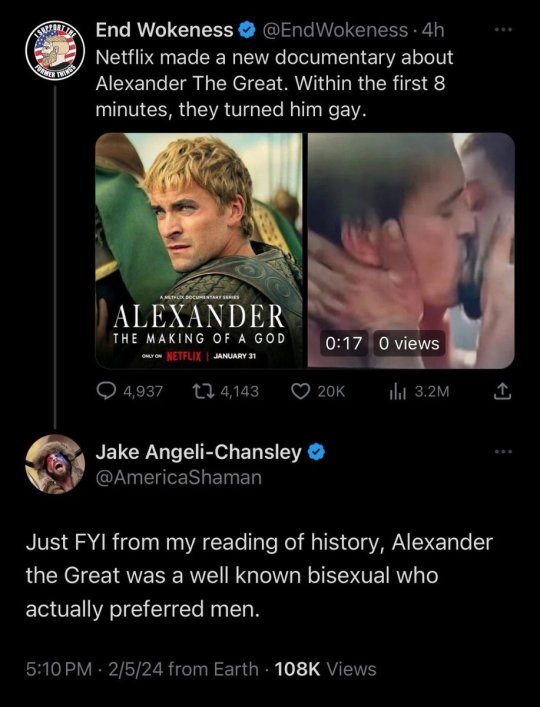
Imagine being so dumb the Qanon Shaman is correcting you about misinterpreting history.
1K notes
·
View notes
Text

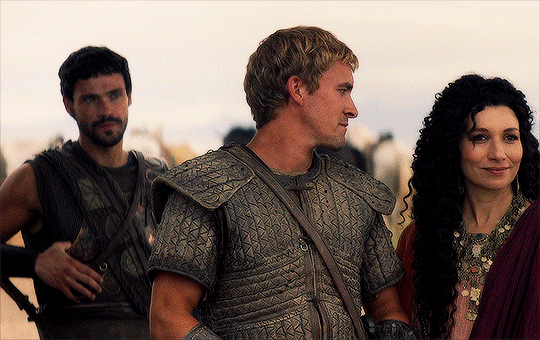
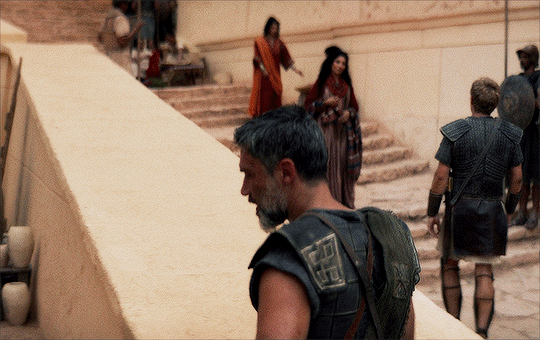
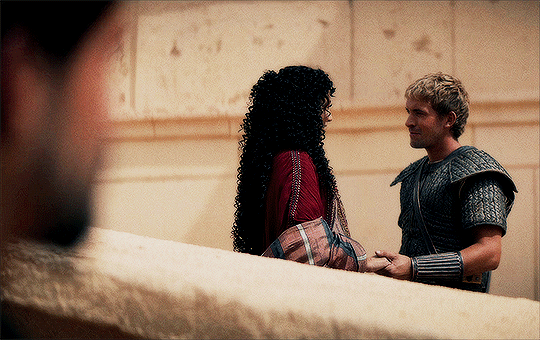

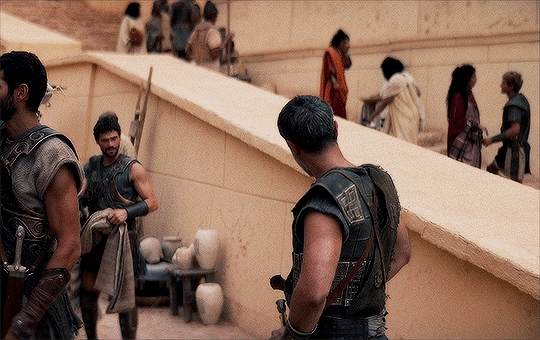
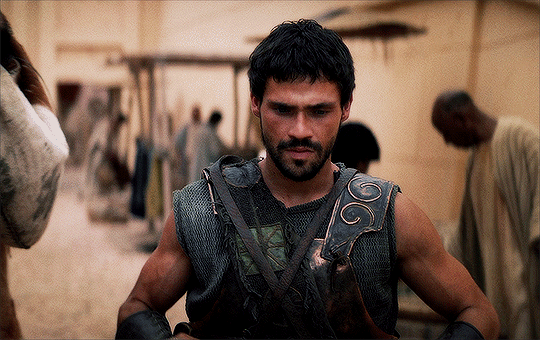


jealous hephaestion in the golden empire
#alexander the making of a god#alexander the great#hephaestion#stateira#perioddramaedit#perioddramagif#buck braithwaite#will stevens#agni scott#mine#oh only for me? you shouldnt have netflix ❤#i keep making these unnecessarily long gifsets for this show but well. who is going to stopme
537 notes
·
View notes
Text
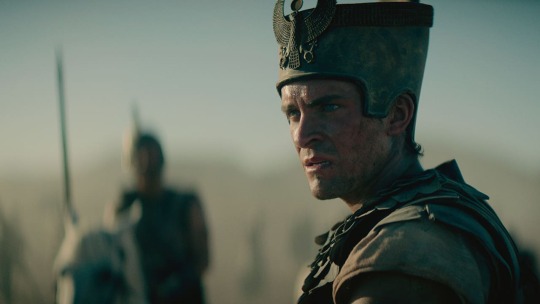
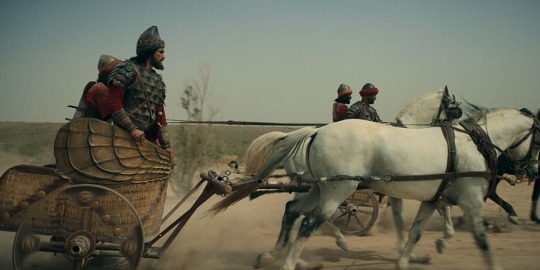
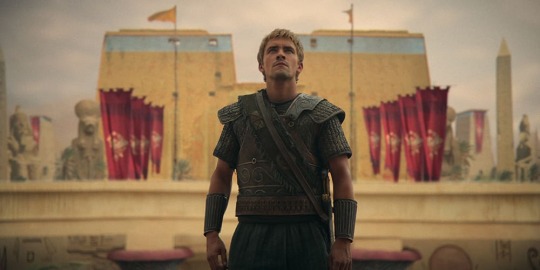
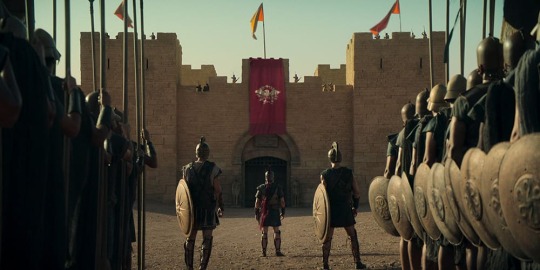
‘Alexander: The Making of a God’: First Look All six episodes drop on Netflix globally on January 31st, 2024. (Source: What's On Netflix | Images Courtesy of Netflix © 2024)
95 notes
·
View notes
Text
Netflix's Alexander the making of a god: pretty rad actually
My judgement: 8/10
While I'm not a history professional but a humble Alexander-the-great enthusiast, and I must admit I cannot judge the historical accuracy of all bits of information presented in the documentary either, I'm still impressed by the overall production as well as the producers' intention.
Firstly, I appreciate the presentation of a "non-Europe-centric" world at the time of ATG (which is objective since this was a pre-colonialism era, where multiple powerful nations outside of Europe existed, such as ancient Persia, ancient India and ancient China) and ancient Persia is portrayed as a strong rival instead of an uncivilised foreign hostile (I laughed every time the Greeks or Persians refer to each other as "barbarians" because this was how almost every ancient kingdom viewed the others, which is funny from a modern perspective). In the same respect, Darius is given a rationale for his motivation and shown as a worthy opponent.
In regards to acting, to me this series has the most accurate casting choices so far, and even if Buck Braithwaite (the actor portraying Alexander) doesn't deliver the sort of grandiose performance one would expect to be suitable for a figure like ATG, I'm moved by how human and nuanced his version of Alexander feels.
I'm definitely pleased with how truthful the relationship between Alexander and Hephaistion is portrayed, it's probably the very first time in human cinematic history that we see a portrayal like this (confettis!).
Regarding the low ratings, I'm aware that there are primarily two concerns resulting in this: 1) conservatives being deeply upset about Alexander being explicitly bisexual. I disregard such opinion completely since I know it is decidedly conservative which I don't agree with; 2) a neutral concern about the show not offering enough historical facts / not being accurate enough. As mentioned above I'm not a history professional, so as a common viewer I can only "blindly" trust the scholars being consulted.
In fact, I found the ratings of nearly all the ATG cinematic productions to be relatively low, from the 1963 Alexander, to the 2004 Alexander, and to this Netflix production. I understand that people throughout the ages have had mountainous expectation for any portrayal of ATG since he was not only a truly competent ruler but also a cultural legacy. And there's also another layer: even though he had accomplished monumental success as a conquerer, nonetheless his conquering brought wars and suffering to the civilians. Although the geopolitical dynamic then was different from that of now, meaning the countries he conquered were not considered "less developed", still you CANNOT tell the contemporary audience, some of whom are descendants from those conquered countries, who are people of colour, that Alexander's conquering of their countries was a natural result of social Darwinism, that these countries deserved to be conquered and casualty didn't matter – it's insensitive. As a POC myself, in my eyes Alexander was very much a hero of his time who had some greatness that all people can aspire to, but his military exploits are morally debatable according to modern standards (I don't hate him, I almost named my cat after him, I only want to view him as dialectically as possible). In sum, positioning the moral of his story for the post-colonial modern audience is tricky. Therefore, this Netflix documentary is the best reimagination of him, at least in my personal opinion.
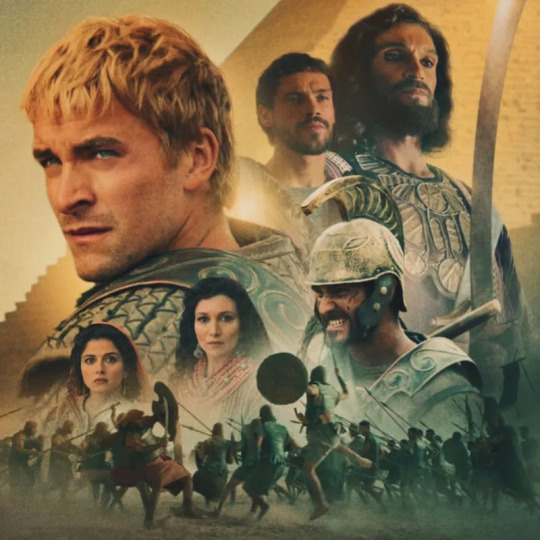
#review#long opinion#alexander the great#alexander x hephaestion#netflix#alexander making of a god#documentary#history
41 notes
·
View notes
Text
Never thought I'd be attracted to a guy named Buck Braithwaite of all things.
#alexander the great#alexander the making of a god#netflix#netflix documentary#dude is kinda fine#i mean those eyes#blue eyes look to the depth of your soul lmao
47 notes
·
View notes
Text
So, you know the infamous nicknames "Alex", "Heph" and "Ptol" they used in Netflix docuseries Alexander: The Making of a God?
In the Italian dub, they don't exist. The translation/adaptation changed all the nicknames into their full names. I don't know the official reason, but my guess is that the translator found them too cringe, and perhaps they didn't want people to blame the dub for that (unfortunately, it happens).
Anyway, the voice actors also did their best to fit entire names where the original actors were just saying the short version:


I'll have to say, that was a good decision. I don't usually watch dubbed shows, but in this specific case the docuseries sounds a bit more serious in Italian.
#alexander: the making of a god#alexander the great#hephaestion#hephaistion#ptolemy#netflix documentary#netflix series#italian dub#ancient history#ancient macedonia
19 notes
·
View notes
Text
Really disappointed because I saw a post on Twitter by some conservative mad that in the Alexander the Great docuseries he's gay within the first three minutes. It's not in the first three minutes. He doesn't kiss a man until nearly 8 minutes.
#alexander the great#alexander: the making of a god#netflix#docuseries#greek mythology#lgbtq#lgbtqiia+
48 notes
·
View notes
Text
I will say this about the new Alexander the Great miniseries on Netflix: it is a true pioneer in vikingsification, in that I think this is the first time it has been applied to antiquity (could be wrong tho)?
It also has the potential to make everyone appologize for all the shit they talked about the 2002 Alexander with Colin Farrel, which pleases me immensely as a Colin Farrel Alexander fan.
(The explanation of what I mean by vikingsification: https://www.tumblr.com/minetteskvareninova/683475480862670848/i-propose-the-term-vikingsification-for-a-type)
#random history#alexander the great#alexander netflix#alexander: the making of a god#watching with baited breath#for the cleopatra miniseries haters#to talk shit about this one as well
37 notes
·
View notes
Note
Do you personally enjoy being interviewed for podcasts? I listen to some history podcasts and my favorite apisoes are always when professors are featured
Depends entirely on the interviewer. I've done only 2 podcasts (one with video, one just audio), and 1 television interview. (I'm not counting The History Channel thing.)
In all cases, the interviewer was knowledgeable and asked interesting questions, so it was enjoyable for me. I hope it was for them too, and they didn't just put up with my blather. All my other interviews have been written.
I'm always curious how many people do listen to those podcasts. Or listen to all of one. This last one I did was an hour and a half! That's a lot of talking. Ha. I think part of my ... not skepticism, but interest/curiosity is that I don't listen to podcasts. I would almost always prefer to read an article/interview than listen to one--although I do listen to NPR radio shows sometimes.
I don't think this purely generational so much as idiosyncratic. I just don't consume a lot of audio anything, even audiobooks* on long drives. I make super-long playlists instead, and think/daydream. Sometimes I "interview" my characters when I'm alone in the car.
All this makes me wonder about y'all, so I made a little poll. Below that are links to the podcasts/interviews if anybody wants them.
Recent podcast with Will John on various things Alexander.
TV interview about the Netflix show, my novels, and historical fiction generally.
Old set of podcasts from 2016, mostly about Hephaistion and Alexander, done before the novels were ever published: Part I, Part 2, Part 3, Bonus (H.'s death)
Link to my website bio with other (written) interviews at the top.
--------------
*(The only "audiobook" I ever listened to was waaaaay back. In the 1970s, a record came out of J.R.R. Tolkein reading parts of The Hobbit and The Lord of the Rings. I may even still have that record!)
#asks#podcasts#Do I like making them?#Alexander the Great#Dancing with the Lion#Netflix Alexander the Great
5 notes
·
View notes
Text
So I was watching the Netflix Alexander series and then I decided to take a look at some other documentaries to see how they portrayed the roommate situation between Alexander and Hephaestion and it’s basically them going:
They were very good confidantes
They were really really really close (in a friendly way)
They were the bestest of the bestest of friends (no homo tho)
Alexander went downhill after Hephaestion’s death in a heterosexual losing your best friend way
35 notes
·
View notes
Text
a quick word about @jeannereames's historical romance series about alexander the great.
#alexander the great#hephaestion#dancing with the lion#jeanne reames#alexander the making of a god#netflix#LGBTQIA#queer fiction#queer novel#queer romance#romance#historical fiction#history#loved it so much#everybody should read this!!
14 notes
·
View notes
Text

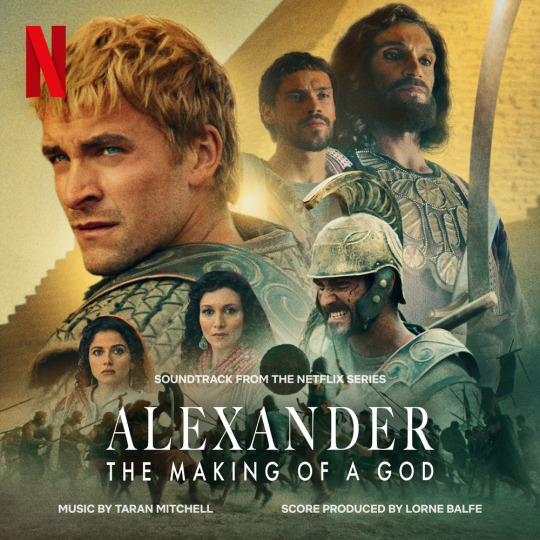
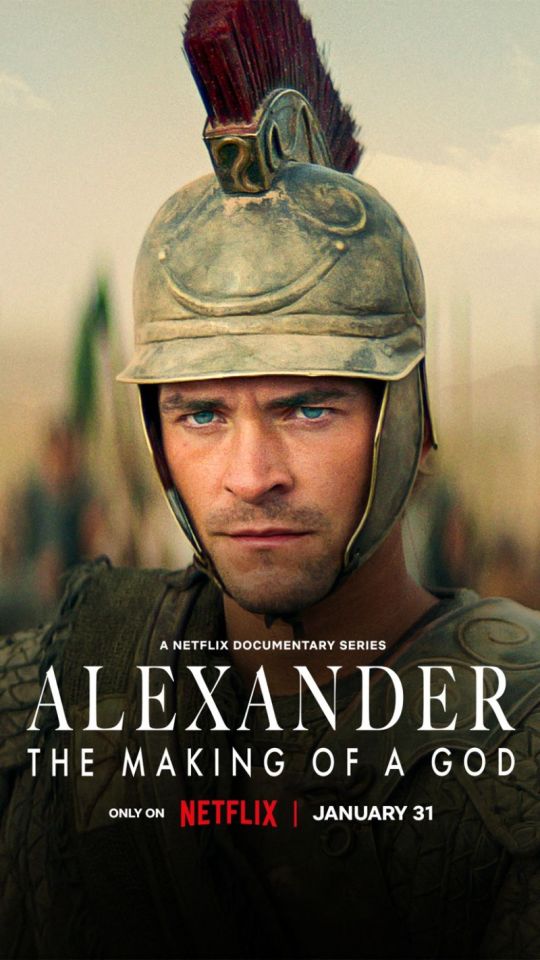

#Netflix#Alexander The Making of a God#alessandro magno#alessandro iii di macedonia#alexander the great#alessandro il grande#alessandro il macedone#alexander the conqueror#alessandro il conquistatore#alexander iii of macedon#alexander of macedon#prossime uscite#Documentary#Alessandro magno come nasce una leggenda#Taran Mitchell
24 notes
·
View notes
Text
Accusing people to have gotten all their greek history and mythology knowledge from Percy Jackson, just because they don't agree with your agenda, is insulting and unfair.
14 notes
·
View notes
Text

What I’m watching (2024 Edition) || The Last Kingdom - Series 3 (2018)
#the last kingdom#watching#watching24#Alexander Dreymon#David Dawson#king alfred#Alfred the Great#Ælfrǣd#netflix
4 notes
·
View notes
Text
I'm so tired of ancient Greece being weaponized for political agendas...
#ooc#their society was different from ours#if you went back there youd be miserable#if you didn't straight up die#which you probably would!#it was not this super accepting place#at the same time though...yes homosexuality was viewed differently. Alexander the Great was bisexual and preferred men.#its not netflix being woke#you don't know what you are talking about
4 notes
·
View notes